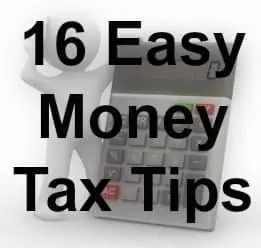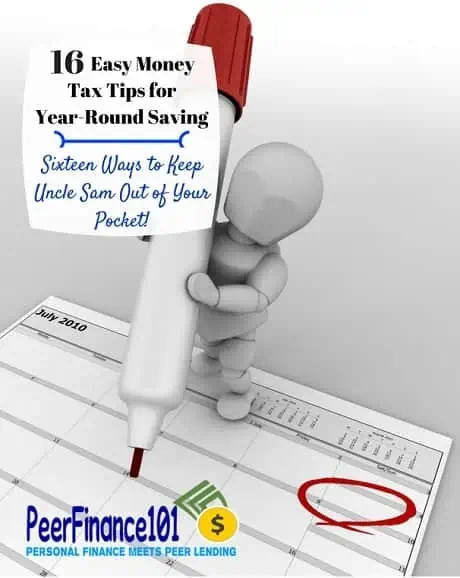Tax tips only seem popular for one month a year but year-round tax planning can save you thousands!
Blog posts on taxes, people couldn’t care less for 334 days of the year. That one month or so every year and tax tips become some of the most searched posts on personal finance.

But are you missing out on saving thousands on your taxes? Can setting a couple of reminders for year-round tax planning keep Uncle Sam out of your pocket?
This article, the fourth post in our 5-week personal finance fix, will try to make tax tips interesting or at least useful in reaching your personal finance goals no matter what time of year you find it. There are a few here that will help you squeeze a little more savings in at the last minute as well as some you should pay attention to year-round.
Check out the first three weeks in our Personal Finance Fix.
Week One: Setting financial goals and how to make a budget you can keep
Week Two: Investing Basics and Beyond
Week Three: Getting to Sandy Beaches: Realistic Retirement Planning
Tax Tips and Some of the Easiest Money You’ll Ever Make
Just because the subject of taxes is not as interesting as investing in the next breakout stock doesn’t mean it isn’t extremely important to your personal finance plan. In fact, taking advantage of the tax tips below could be some of the easiest money you’ll ever save.
The richest 1% have been using loopholes and other tax tricks since the government started collecting taxes. They have the benefit of teams of advisors to handle their tax planning all year.
You and I may not have the same resources but that doesn’t mean we can still save some money.
In fact, most of the tax tips below can be done at any point in the year. For the ones that take a little more planning, I like to set an email reminder that goes off once a year.
Taking advantage of tax loopholes and credits means you don’t have to spend hours analyzing stocks, trying to get a better job or sacrificing current spending to meet your financial goals. It’s free money and it can add up big time over the years.
This list is updated to the 2016 tax code and may change in the future. Make sure the tips apply to your personal situation before sinking too much money into each.
Tax Tricks for Getting More from the Work You Do

1) Expenses you paid to find a job are generally deductible, but only up to 2% of your adjusted gross income. Remember to record any food or lodging expenses, agency fees, printing and postage, as well as any transportation costs including $0.56 per mile you drive.
2) If you’re expecting to pay more taxes for this year, consider pre-paying some of your expenses for next year. You can pre-pay professional dues, subscriptions, charitable contributions and a host of other items. It may mean a little more in taxes next year but will lower your taxes this year and who knows what next year will bring
3) There’s a whole list of deductions and credits if you’re self-employed. Even if you have a full-time job but pay taxes on a side job you work, you can qualify for a lot of the benefits. You can deduct a portion of the utilities you pay and rent for your home. Any subscription services, traveling or other expenses you pay are also deductible.
These are some of the most common tax tricks used by the rich. You don’t have to be a full-time entrepreneur to take business deductions on your taxes. I’m not saying to spend money on a business that is never going to make money but starting your own side-gig may just be the way to find your financial independence.
Check out this guide on jobs you can start from home and make big-time money on a part-time basis!

Education Pays in Tax Planning
4) Surging costs for education are keeping a lot of people from going back to school but the Lifetime Learning Credit can help offset those costs. The credit can be taken anytime, even if you’ve been out of school for years. You deduct 20% of your annual education costs up to a credit of $2,000 and can include vocational school, job training, and just about any classes.
5) If you live in a state with high income taxes, you might want to consider a 529 college savings plan. It’s like a retirement plan except for education expenses. You get a credit for the money you put in if you live in one of the 34 states that allow it and you never pay any taxes on the money as long as it’s used for educational expenses. You’ll still have to pay federal taxes on the money when it was earned so it’s not quite as good as retirement account benefits.
529 Savings Plans are a triple-tax tip! You get a deduction on your income when you put the money in, the money grows tax-free in the account and you don’t pay taxes on withdrawals if spent on approved educational costs.
Tax Tips for Everyday Life
6) If you’re charitable gift is over $250, don’t forget to ask for a letter from the organization. Anything less and your receipts will work. Every little item adds up so don’t forget to count postage on letters, out-of-pocket expenses and $0.14 per mile for any driving. If you need a little more tax help this year, set up a donor advised fund with a broker that will pay out to charities over the coming years. You’ll get to write off everything you put in it now.
Charitable contributions don’t have to be monetary. You can donate your time, stocks and other resources for a deduction. Donating appreciated stocks means you not only get the current deduction but don’t have to pay capital gains on how much the investment has increased.
7) The Child-Care credit is one of my favorite for several reasons. First, it reduces your tax bill dollar-for-dollar up to $5,000 a year. More importantly, it might help to pay for a little better child care for your son or daughter. You can qualify for a tax credit of between 20% and 35% of child care expenses.

8) State sales tax deductions regularly expire only to be later renewed by Congress. If you itemize your deductions, the IRS allows you to either deduct state income taxes or state sales taxes you paid. If you’re state doesn’t have an income tax then you could save thousands by deducting sales tax. The IRS even has an easy sales tax calculator for figuring how much you can deduct given your state, income and number of dependents.
9) You can deduct all the points you pay on your mortgage during the same year you buy a house. If you refinance, you have to spread that money across the life of the loan. A lot of people forget to deduct their refinanced mortgage points every year so make a note of it. If you sell your house or pay off the mortgage early, you can deduct all the points you haven’t yet claimed.
10) If you have mutual fund dividends automatically reinvested then don’t forget that those dividends increase the cost basis of your shares. A higher cost basis means less capital gains taxes when you go to sell the shares. It’s an often overlooked item because a lot of mutual funds may not report your newer cost basis. Forget to increase your cost basis for the dividends and it’s like paying taxes twice on the money.
11) Some employers continue to pay your salary while you’re on jury duty but require that you hand over any money paid by the state. Problem is that you will be paying taxes on that money the state gives you for jury duty. If this is the case, you can write off that money you forfeited to your employer on line 36 and won’t have to pay taxes on it.
12) Uninsured costs of getting back to normal after a natural disaster are often deductible.
13) You can deduct any medical insurance premiums over 10% of your adjusted gross income. For the self-employed, you can deduct all your medical insurance premiums. Just one more tax trick for entrepreneurs!
14) If you itemize your expenses and spent more than 2% of your adjusted gross income on financial planning, you can deduct that excess. Remember to include any subscription costs and consulting fees.

Big Time Retirement Tax Savings
15) The biggest tax benefits continue to be the free money for retirement contributions. I’m always amazed at how many people fail to take advantage of the tax benefits to an IRA or at least employer matching on their 401K plans. Money invested in tax-deferred retirement plans is one of my favorite ways to make investments go farther.
You can contribute up to $5,500 into your individual retirement account or up to $18,000 into your 401k plan. The income tax savings alone will save you more than $2,000 using a tax tool even if you are in the LOWEST tax bracket. Add up the fact that none of the investment gains are taxed until you withdraw the money and you could be looking at hundreds of thousands of dollars in savings.
And that isn’t even including the free money you will get from your employer if they offer a match.
The chart shows the ending value at 65 for a 401K plan and a normal investment portfolio, assuming a 6% contribution of $45,000 and 3% annual salary growth. I use 6% because that is a common threshold for employer match contributions. The contributions on the regular portfolio are taxed at 28% and no capital gains tax is calculated for either portfolio.

Without the tax benefit and matching contribution, you would have to work to 79 years old or boost your contribution to almost 17% of your income just to get to the same amount.
16) If your income is below a certain threshold, $55,500 for married couples and $27,750 for singles, you can take a credit up to $2,000 for the amount you put in your retirement accounts. It’s called the Retirement Savings Contribution credit and is meant to help persuade people to save. Just another reason to take that free money in saving for retirement.
That’s 16 tax tips that can save thousands in taxes but it’s a pain remembering them all. Some you can set up once and don’t have to worry about it like your retirement savings contributions. Setting up an email reminder to go off in September of each year makes it easier to make sure you’ve got the most out of the rest. Spend an hour or two tax planning early in the year to make sure you save as much as possible when Uncle Sam comes calling for his money.
Most tax tips will have to be managed during the year you plan on using them but there are a few that you can get in before the April filing deadline. Remember, a lot of the thresholds are based on adjusted gross income so you might still qualify even if your take-home pay is higher. It’s only once a year but these tax savings can add up and move you a lot closer to meeting your financial goals.
